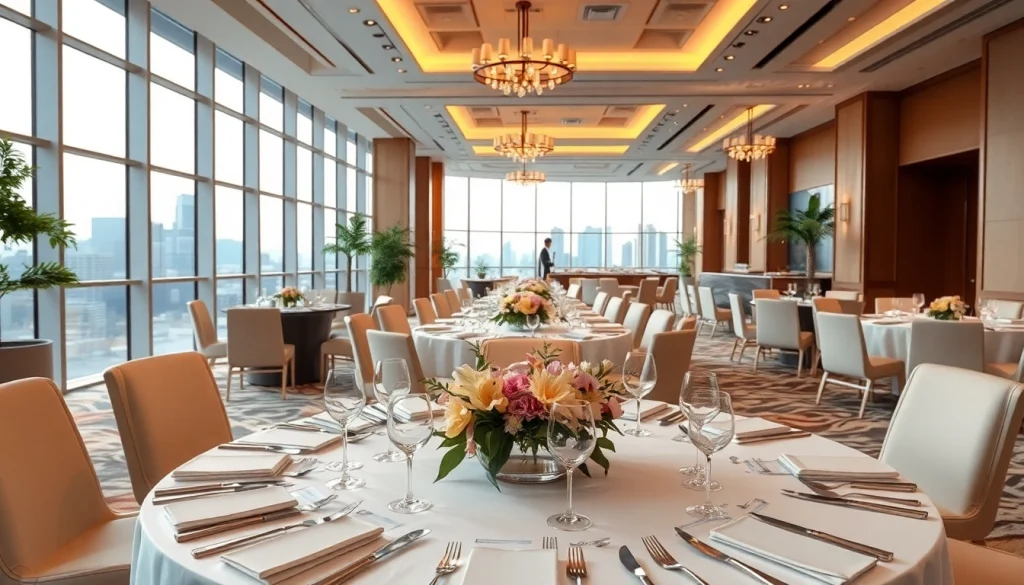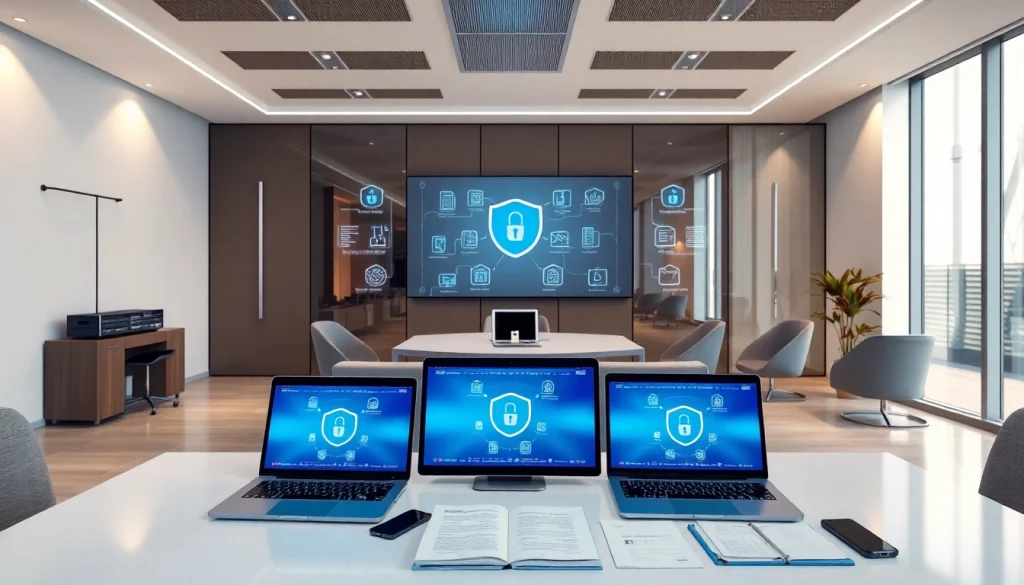Understanding the Importance of an Event Space
When organizing any gathering, whether it’s a corporate meeting, wedding, or a birthday party, the choice of a venue plays a crucial role in the event’s overall success. An event space is more than just a physical location; it sets the atmosphere, influences guest interactions, and even impacts how attendees perceive the purpose of the event. Understanding the multifaceted significance of the right event space allows planners to tailor experiences that resonate deeply with participants.
Defining Your Event Goals
Before selecting an event space, it’s imperative to clearly define the objectives of your gathering. Are you seeking to inform, entertain, or inspire? Each goal requires a different approach and, consequently, a different environment to optimize its effectiveness. For instance:
- Informational Goals: For workshops or conferences focused on education, a space equipped with technology for presentations and break-out areas for discussions is essential.
- Entertainment Goals: Events aimed at entertaining guests, such as weddings or parties, often benefit from an aesthetically pleasing ambiance that encourages social interaction.
- Inspirational Goals: If the goal is to inspire creativity or innovation, look for unique venues that stimulate ideas through their design and atmosphere.
Identifying the Right Audience
Understanding your audience is key to selecting an appropriate event space. Different demographics come with varying expectations regarding comfort and accessibility. For example, a professional audience might prefer a formal setting with modern conveniences, while a youthful crowd might enjoy more casual, vibrant environments. Further considerations include:
- Age Range: Different age groups may gravitate towards different types of venues—older audiences may prefer quieter, more traditional spaces.
- Interests and Backgrounds: An audience with a creative background might appreciate eclectic spaces rich in character.
- Accessibility Needs: Ensure that the venue is accessible for everyone, including those with disabilities.
The Role of Atmosphere in Event Spaces
The atmosphere of an event space significantly contributes to the overall experience. This atmosphere is created through a combination of lighting, decor, furniture, and even the layout. Some important elements to consider are:
- Lighting: The right lighting can transform a dull room into an inviting space, setting the desired mood—bright, focused lighting for work-oriented events versus softer lighting for relaxed social interactions.
- Decor: Decor should reflect the event’s theme and purpose, adding character and visual interest that aligns with guests’ expectations.
- Furniture Arrangement: The layout of seating and tables can either facilitate or hinder interaction—think about a circular layout for discussions versus traditional rows for presentations.
Key Factors to Consider When Selecting an Event Space
Selecting the right event space involves examining several critical factors. Each plays a significant role in shaping the event experience.
Capacity and Layout of Event Spaces
The capacity of an event space is one of the first considerations. You must ensure that the venue can comfortably accommodate your guest list. Overcrowding can lead to discomfort, while too much empty space can affect the event’s atmosphere. Assess the following:
- Maximum Capacity: Understand not only the total capacity but also the optimal configuration for your event type.
- Layouts: Consider flexible layouts that can be adjusted based on the size and purpose of the event, such as theater-style seating for presentations or rounds for dining.
- Flow: Ensure that the layout allows for easy navigation and access to essential areas, such as restrooms, exit points, and catering stations.
Location Accessibility for Guests
A venue’s location can greatly influence guest attendance. An accessible location minimizes travel barriers and can increase turnout. When evaluating location, consider:
- Public Transport Links: Proximity to public transport options can ease travel for guests.
- Parking Facilities: Adequate parking or valet services can significantly enhance convenience, especially for events with many attendees.
- Safety: Consider whether the area is safe and inviting for guests arriving at different times.
Essential Amenities and Services
Different events require different amenities. Prioritize venues that offer essential services needed for your specific gathering. Some key amenities may include:
- Audio-Visual Equipment: Technology for presentations or performances can add value by enhancing communication and engagement.
- Catering Services: On-site catering or partnerships with local caterers can streamline the planning process and enhance guest satisfaction.
- Wi-Fi Access: Reliable internet connectivity is essential for most modern events, especially for business conferences or virtual engagements.
Types of Event Spaces Available
Event spaces come in various types, each suitable for specific gatherings. Understanding these can help you identify which is best for your needs.
Corporate Event Spaces
Corporate event spaces are designed for business meetings, conferences, and training sessions. They typically include:
- Conference Halls: Large spaces equipped with the necessary technology for presentations.
- Meeting Rooms: Smaller, more intimate settings for team discussions or client meetings.
- Break-out Spaces: Areas designed for brainstorming sessions or informal conversations.
Social Event Spaces
These venues cater to personal celebrations such as weddings, anniversaries, and family reunions. Characteristics often include:
- Ballrooms: Elegant spaces with dance floors and staging for ceremonies and receptions.
- Party Rooms: Versatile spaces often customizable to fit the theme of the event.
- Outdoor Venues: Gardens, backyards, or parks that provide a natural setting for celebrations.
Outdoor vs. Indoor Event Spaces
Choosing between outdoor and indoor venues depends on various factors including season, audience comfort, and event type. Consider:
- Weather Factors: Outdoor spaces can be beautiful, but ensuring a contingency plan for inclement weather is crucial.
- Scenery: Outdoor venues can provide stunning backdrops, while indoor spaces offer controlled environments with climate control and protection from the elements.
- Noise Levels: Outdoor events might be affected by uncontrollable external noise, unlike most indoor settings that allow for better sound management.
Budgeting for Your Event Space
Establishing a budget is vital when planning an event. It’s essential to consider not just the cost of the venue but all related expenses. Planning a realistic budget will help allocate resources effectively.
Understanding Rental Costs
Rental costs can vary widely based on the location, size, and amenities of the event space. When budgeting, evaluate:
- Base Rental Fee: Understand what is included in this fee—some venues offer packages that encompass various services.
- Seasonality: Costs might fluctuate based on the time of year; off-peak seasons can result in significant savings.
- Length of Rental: Rental fee structures may differ based on the duration of the event—know if you are being charged hourly or via a flat rate.
Hidden Fees to Watch Out For
While planning, be aware of potential hidden costs that can escalate the budget quickly. These may include:
- Cleaning Fees: Some venues charge additional fees for post-event cleaning.
- Security Deposits: Many venues require a security deposit that may or may not be refundable based on condition upon your departure.
- Service Charges: Always read the fine print regarding any mandatory service charges that can add up over time.
Negotiating Terms and Conditions
Don’t hesitate to negotiate terms with the venue provider. This can lead to better terms that benefit your event budget. Key areas to focus on include:
- Payment Plans: Inquire about flexible payment options that can ease upfront financial burdens.
- Cancellation Policies: Understand the cancellation terms; consider negotiating favorable terms in case of unforeseen circumstances.
- Package Deals: Ask about bundled services that might offer better value than booking each service individually.
Maximizing the Potential of Your Chosen Event Space
Once you have selected your venue, maximizing its potential becomes your next challenge. It’s about transforming the space to suit your event’s needs and ensuring a memorable experience for your guests.
Decor and Ambiance Strategy
Transforming the ambiance of the event space through careful decor choices can greatly enhance the guest experience. Consider:
- Thematic Decor: Align your decorations with the event’s theme for a cohesive experience.
- Lighting Effects: Use mood lighting to create the right atmosphere, integrating color and brightness level to fit the occasion.
- Interactive Decor: Incorporate elements that encourage guest interaction, like photo booths or creative seating arrangements.
Plan for Layout and Flow
An effective layout maximizes engagement and comfort. Strategize the flow of the space by:
- Smooth Transitions: Design the layout to encourage smooth movement between different areas of the event, from welcome desks to breakout sessions.
- Guest Interaction Points: Create spaces where guests can mingle and interact, like coffee stations or lounge areas.
- Event Timeline Coordination: Factor in the event schedule when designing the layout, ensuring that each part aligns with the flow of activities.
Utilizing Technology and Equipment
In the digital age, technology plays a pivotal role in enhancing event experiences. Consider these tech integrations:
- AV Systems: Ensure the rental of high-quality sound and visual systems capable of serving the venue size adequately.
- Live Streaming: Consider using technology to stream events for a wider audience, catering to those unable to attend physically.
- Event Management Tools: Leverage event management software for registrations, schedules, and attendee engagement to streamline coordination.








